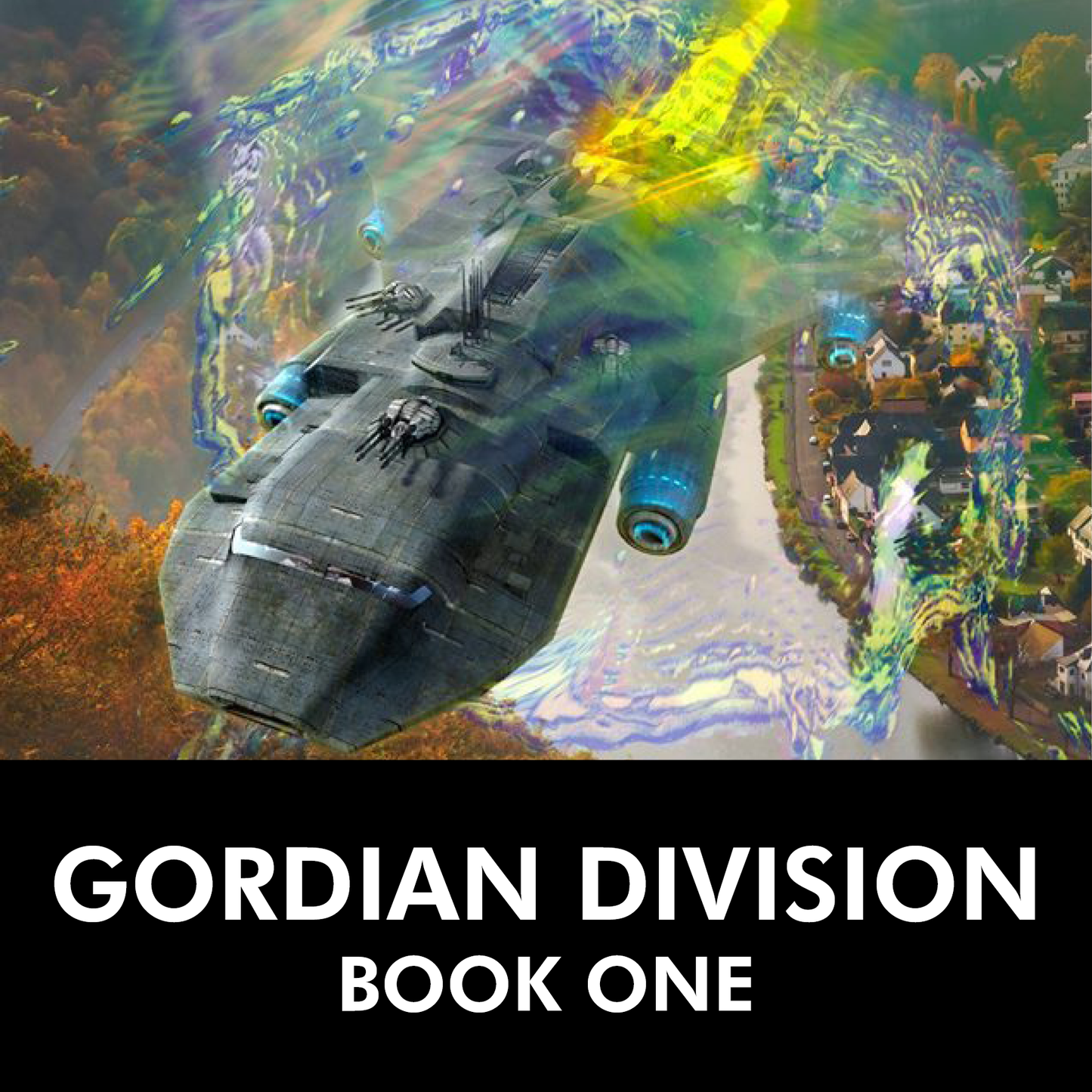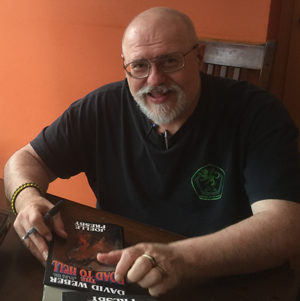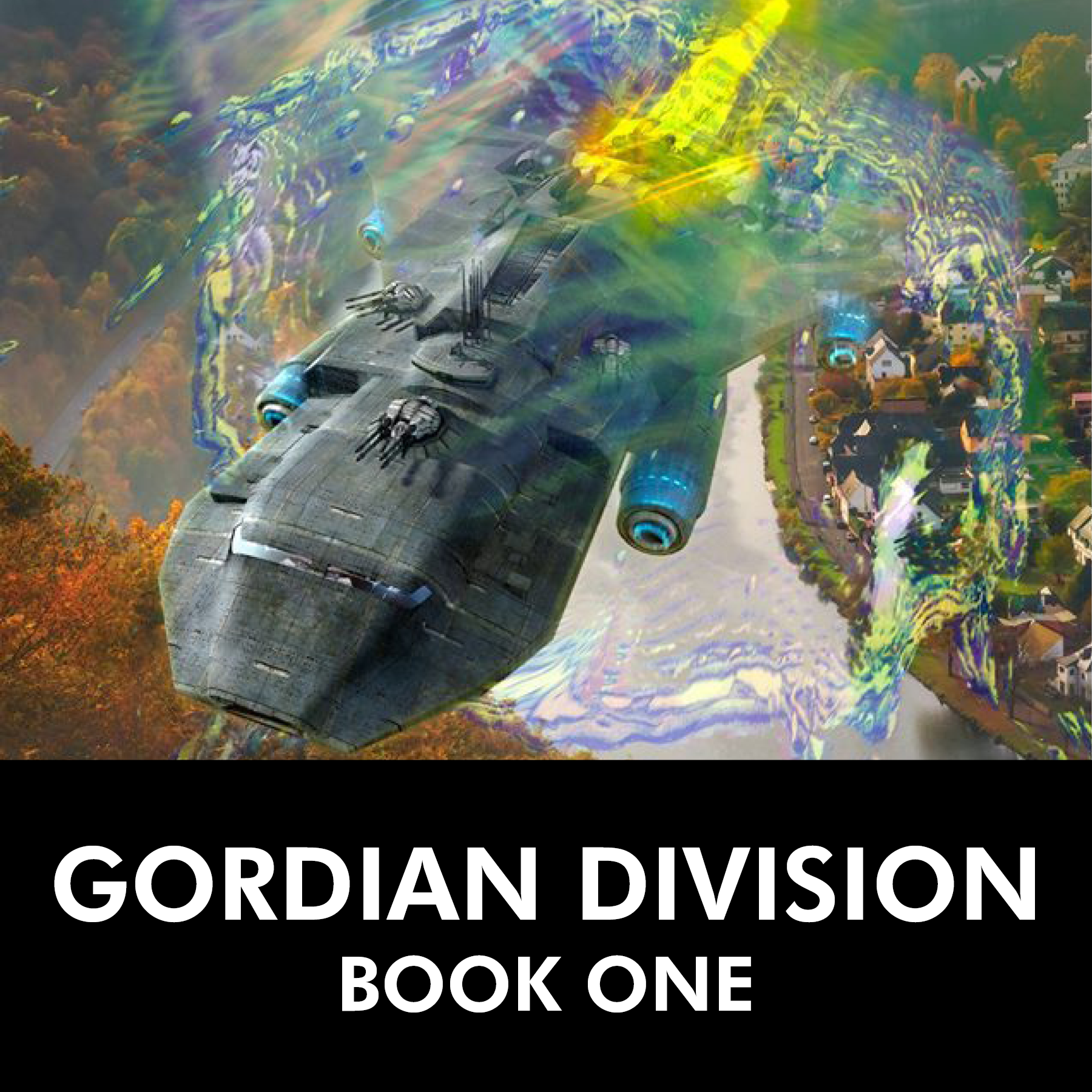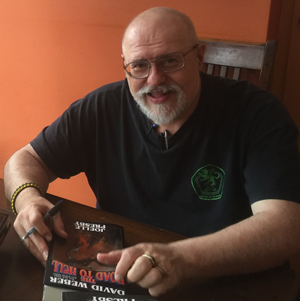




Book One in the Gordian Division series. Published by Baen Books.
About this premium SIGNED MASS MARKET PAPERBACK:
Signed by both David Weber and Jacob Holo. Contact us at holowriting (at) holowriting.com for personalization requests.
Prefer a different format? Click here.
NEW NOVEL FROM NEW YORK TIMES BEST-SELLING AUTHOR OF THE HONOR HARRINGTON SERIES, DAVID WEBER
A Man of Two Worlds
Dr. Benjamin Schröder was far from a man of action. In fact, he was a history teacher—Chairman of the Castle Rock University history department—and if his life wasn't perfect, it was close. Until, that is the discussion of his star student Elzbietá Abramowski's dissertation on Operation Oz, the Pacific Allies' invasion of Vladivostok, staged through occupied Japan to meet their Imperial German allies, was brutally interrupted.
The psychotic episode that turned his entire world upside down struck with absolutely no warning, and it was more terrifying than anything he should have been able to imagine, leaving him with a complete, incredibly detailed set of false, nightmare "memories." Not just of his own life, but of an entire, ghastly world in which Operation Oz had never happened. In which millions of helpless civilians had been systematically slaughtered in "extermination camps" that were horrific beyond belief. In which there was still a Soviet Union. In which the Chinese Communists had succeeded, the Korean Peninsula had been permanently divided, thousands of nuclear warheads had spread their deadly threat across the entire Earth, and the Middle East was a festering sore of bloodshed, fanaticism, and terrorism.
The knowledge that those false memories had come from somewhere inside his own psyche was terrible, but with the help of Commander Abramowski, a highly decorated Navy fighter pilot who’d been forced to deal with her own PTSD after crippling combat wounds invalided her out of service, he’s put his life back together. With Elzbietá's support, he's learned to deal with the nightmares, to recognize that they are only nightmares that can't—and won't—be permitted to rule his life.
Until, that is, a lunatic named Raibert Kaminski knocks on his door one afternoon with an impossible and horrifying story about alternate realities, time travel, temporal knots, and more than a dozen doomed universes which must inevitably die if the temporal storm front rushing towards the distant future isn't stopped. He has to be lying, of course. Or completely insane. But what if he's not a madman after all? What if he's actually telling the truth?
That possibility is the most terrifying thing of all. Because if he is, the false memories aren't false after all, and that other world is just as real as the one Schröder has always known. And if that's true, Benjamin Schröder is about to become the greatest mass murderer in human history, because he has to choose. Whether he acts or refuses to act, Benjamin Schröder is the one man who will decide which universe lives and which dies, along with every star system, every galaxy—and every single human being—in it.
Including the woman he's discovered he loves more than life itself.
⭐⭐⭐⭐⭐
“Tom Clancy-esque exposition of technical details . . . absurd humor and bloody action. Echoes of Robert Heinlein . . . lots of exploding temporal spaceships and bodies . . . action-packed . . .” —Booklist“[A] fun and thrilling standalone from Weber and Holo. . . . Time travel enthusiasts will enjoy the moral dilemmas, nonstop action, and crisp writing.”—Publishers Weekly
This product is a premium mass market paperback novel.
Prefer a different format? Click here.

Enjoy a sample from THE GORDIAN PROTOCOL
Alexandria
30 BCE
“You, my friend, have had too much cheap wine,” Homeros the Baker said slowly and with great precision, bracing himself upright—as unobtrusively as possible—against the statue of some no doubt once-important noble.
“No,” Asklepiades, who owned the pastry shop next to Homeros’ bakery, replied after careful consideration. “I have not had too much cheap wine. I would say”—he paused to belch noisily—“that I have, in fact, had almost exactly the right amount. And it wasn’t all that cheap, now that I think about it,” he added owlishly.
“Well, it was better than the swill Lysippos normally gives us,” Homeros pointed out. “And a man doesn’t celebrate the birth of his third son every day.”
“And if you come home stinking of wine and”—Asklepiades paused to sniff loudly—“puke and piss, if I’m not mistaken, Kleopha is going to turn her third son into a fatherless waif. Probably with the dullest knife she can find.” He considered that for a moment, then nodded gravely. “And probably as slowly as possible.”
“It’s not my puke!” Homeros protested. “It was that stupid Cypriot. I should have broken his head for him. A sailor who can’t hold his drink shouldn’t drink.”
“You didn’t break his head for him because he had six of his friends at the table with him. And do you really think Kleopha’s going to believe that?”
“I rule my house with a rod of iron!” Homeros’ grand pronouncement was rather undermined by the sway—one would not have cared to call it a stagger—as he waved his right hand in punctuation.
Asklepiades snorted.
“The only rod of iron in your house is the rolling pin Kleopha’s about to apply to your skull. Repeatedly,” he informed his friend.
“Ah!” Homeros grinned at him and laid one finger aside his nose. “But only if she sees me like this.”
“Smells you, you mean!”
“Same thing, same thing.” Homeros made a brushing away gesture. “And she won’t. I’m going to sneak in the back way and sleep in the shop tonight. The baby’ll keep me up all night if I don’t, anyway. Then, in the morning, I’ll make a quick trip to the baths.”
“And she’ll cut off your balls with a paring knife if you stay out all night.”
“Nonsense.” Homeros chuckled. “I slept in the shop because you kept me out so late I was certain she’d be sound asleep by the time I got home. And I know how little sleep the baby’s letting her get. So I didn’t want to disturb her. And,” he added triumphantly as Asklepiades looked at him skeptically, “I shall redeem myself by not only smelling fresh and clean but appearing armed with one of your meat pastries for her breakfast because I love her so.”
“Ha! I’ll admit, that’s cleverer than you usually manage, especially when we’re both drunk. But it still won’t work, because—”
“Jupiter Optimus!”
Asklepiades jumped in astonishment, then whipped around to see what his friend was staring at. Whatever it was, it had turned Homeros pale as a ghost. Asklepiades had never seen Homeros look that way, but, as he spun about, he felt his own jaw drop in terror-tinged disbelief.
The brilliant…shapes sweeping in across the harbor of Alexandria blazed against the night sky like Zeus’ own lightning bolts. The lantern atop the mighty lighthouse was scarcely an ember in comparison, and they moved with terrifying speed across the long mole connecting the island of Pharos to the city. Their brilliance reflected in the glassy waters of the Great Harbor east of the mole, and he fell to his knees in shock as they sped silently overhead.
His head turned, tracking their passage, and his eyes widened as they swooped past the Serapeum and headed directly toward the Great Library. They were slowing, altering course, spreading out like the petals of some enormous flower. And then, they weren’t moving at all. Six of them simply…floated there in midair, spaced equidistantly in a ring around the library campus. But four more of them—the largest of the lot—didn’t float in the air. They settled downward, landing on the campus. From their apparent size, they must be crushing statuary, ornamental trees and gardens, and gods only knew what else under them as they came down.
Alarms began to sound all across the sleeping city as it awakened to the celestial visitation, and Asklepiades felt his lips moving in silent prayer to every deity and demigod he could think of.
And that was when he heard the first screams, the first shattering bursts of sound, and saw the terrible flashes of light bursting across the city streets and the grounds of the Royal Palace.
Somehow, he doubted Kleopha would find the time to berate her wayward husband after all.
* * *
“How tall is that thing?” Kai-shwun McGuire asked, tipping back in his command chair and looking at the magnified image of the great three-tiered tower on the island in the harbor. The lowest section was square, the next was octagonal, and the uppermost was circular. A fire burned before the polished mirror at its apex, and it was visible at a surprising distance, given the primitive nature of the illumination.
“Really have to ask one of the docs if you want a hard number,” Lydia Robles, his copilot and weaponeer told him. “I’m sure one of them’ll be just delighted to give you all the details. From here”—she checked one of her displays—“looks like it’s close to a hundred and forty meters or so, give or take.” She shrugged. “It’s impressive looking, I suppose, under the circumstances. Hate to build the bastard without counter-grav, myself.”
“Yeah.” McGuire nodded, then brought his chair back upright. “Got some movement. Looks like some kind of city guard headed toward the target.”
“On it,” Robles replied, and her brown eyes had gone slightly unfocused as she communed with the TTV’s onboard systems through her wetware implants.
Unlike most of the Antiquities Rescue Trust’s security teams, neither she nor McGuire had acquired abstract companions. It wasn’t that she had anything against connectomes, whether they’d once been flesh and blood or were completely artificial constructs. She’d just never felt the need for one, and she was only fifty-six. There was plenty of time for her to find one among the abstract citizens she’d met…if she decided she needed one. At the moment, though, Kai-shwun made about as satisfying a companion as she could imagine. She’d tried the virtual sex route a couple of times, and they were right: it was almost impossible to tell the difference. Except that she knew it was artificial even while her nerves were being convinced it wasn’t, and she supposed she was some kind of throwback, because she vastly preferred the real thing.
She snorted, amused by the way her mind wandered—and to where—at moments like this.
“Got any idea who sent them?” she murmured as the tracking systems came online and the TTV’s weapons slewed obediently to follow the armed and armored men marching purposefully, bravely, and incredibly stupidly toward the Library from the Royal Palace proper.
“God only knows, and He ain’t talking.” McGuire shrugged. “Probably whoever’s in charge of the palace. Whoever the hell that is!”
“Yeah, yeah,” Robles said a bit more loudly. “Damn, wish I’d paid more attention to the briefing. I can’t quite remember . . .” She snapped her fingers suddenly. “Cleopatra! That’s who they said it was.”
“And who was Cleopatra?” McGuire demanded.
“Damned if I know. I just hate forgetting names. Seems, I don’t know…unprofessional I guess.”
“Well you better get your professional on,” he told her. “Those guys are going to cross the zone in about another five seconds.”
“No they aren’t,” she told him with a chuckle, and activated the fire command.
The revolving cannon was only one of the TTV’s weapons, and it was certainly the most conceptually ancient. It was also the noisiest, which was the main reason she’d selected it. Personally, she didn’t care how many indigenes got blown away on one of these missions, but some of the academics were a little more squeamish than she was. She didn’t understand why, exactly. She’d seen VRs which were a lot bloodier than anything the academics ever saw. Well, out here on the perimeter, anyway. It could get…messy with the smash-and-grab teams closer in, she supposed. Still, that wasn’t her problem and she was perfectly willing to defer to the tender sensibilities of the hothouse flowers who paid the freight. From her perspective, dead was dead, but if they wanted deterrence rather than destruction, she’d give it to them, as long as her own rosy posterior wasn’t in the line of fire if she didn’t, and very few things in life had as much deterrence as the cannon. It made a lot of noise when it fired, every tenth round was a tracer, and the kinetic impacts when four thousand rounds per minute hit the target were pretty impressive. Even the stupidest local figured out real quick that he didn’t want to tangle with that!
Of course, before they can figure it out, you have to give them an illustration, she reminded herself.
* * *
Perikles Petrakis watched from the palace window as Captain Hermagoros led the royal guard detachment toward the Library. Hermagoros was a braver man than Perikles. More to the point, he had the duty tonight, thank all the gods! Although exactly what he and his men were going to accomplish—
A night already turned to chaos and terror by the glaring lights floating in Alexandria’s skies splintered suddenly into even greater terror as Jupiter Toton’s own lightnings erupted from the nearest light. It was a single, glaring, brilliant line, stretched down from the floating thing like a bar of fire, and where it touched, the earth itself exploded in threshed, shredded ruin.
And so did Captain Hermagoros and his entire guard detachment. They simply…disintegrated into bits and pieces in a concentrated tornado of inconceivable violence.
* * *
“Think they got the message?” Robles asked, opening her eyes again to grin at her partner.
“Question is if anyone was watching,” McGuire replied a bit sourly.
“Oh, they were watching!” she assured him. “Reason I like that gun so much. Can’t miss it the way you might a laser. More efficient in atmosphere, for that matter. And it sure is spectacular.”
McGuire grunted. The tracers turned the cannon’s torrent of projectiles into what looked for all the world like the “death rays” he’d seen in some ancient entertainment vids. And she was right about how spectacular that was.
“Well, at least we’re not one of the entry teams,” he told her. “That can get a little too up close and personal for my taste.”
“Damn betcha!” Robles agreed. “They can keep their hazardous-duty bonuses, for all I care. Give me a nice air-conditioned command couch a couple of hundred meters up any day. Last thing I want is for some hairy primitive to get lucky and stick a sword into my hide!”
McGuire grunted again, but she had a point. The entry teams’ Esteem bonuses were all well and good, but every so often they lost someone, even with modern medicine. It didn’t happen often, but it did happen. And even if someone managed not to get killed, regenerating a new arm, or leg—or spleen—was no walk in the park. Of course, half of the entry team personnel were synthoids, with their personalities uploaded into synthetic bodies equipped with police-grade upgrades. Not as good as SysPol got, but pretty damned good. He’d considered putting in for upgrade himself, but he liked the body biology had given him just fine, so far at least.
And so did Lydia.
Besides, he admitted to himself, the real reason he’d never applied for entry-team duty had very little to do with synthetic bodies or potential risk factors. Entry duty was so…messy, sometimes. He vastly preferred being up here with Lydia where the carnage was nice and antiseptic and he didn’t have to worry about wiping blood and splattered viscera off his helmet cameras.
* * *
“Damn it, Johansson!” Doctor Teodorà Beckett snapped. “We want these documents intact, you idiot! That means not shredded by mag darts—and not soaked in blood, either, for that matter! Is that so hard to understand?”
The archaeologist stood in the huge, colonnaded hall, surrounded by books and racked scrolls. Despite the lateness of the hour, oil lamps burned brightly and half a dozen scrolls had been unrolled for reading on the polished wooden tables down the hall’s center. It could have been an orderly scene of scholarship…if not for the bodies of at least a dozen of the library’s staff scattered about, leaking blood across the inlaid floors. It was hard to be certain of the exact number; hypervelocity mag darts had a tendency to shred their targets pretty badly. She didn’t mind that so much, although she’d tossed her cookies on her first ART mission, but Johansson’s people had been dismayingly careless about their lines of fire. The torrent of darts one of his teams had unleashed before Beckett could get there to stop them had turned at least forty or fifty scrolls into shredded, blood-soaked mulch which was undoubtedly seasoned with bits and pieces of human flesh.
“Listen, Doctor Beckett”—the entry team leader made no great effort to hide his own exasperation—“if one of these yahoos gets close enough to stick a knife into you, you aren’t going to be real worried about the frigging books!”
“The ‘frigging books’ are the reason we’re here,” she pointed out tartly.
“So block them on the schematic.” Johansson pointed at them. “After we finish here, I’ll microjump back and collect just those racks.”
Beckett glared at him, longing to rip his head off and stick it up his synthoid body’s anal orifice. Unfortunately for her sense of frustration, he was right. Once the retrieval team pulled out, temporal inertia would have its way and erase the fact that they’d ever been here. He could always jump back into a present in which the scrolls had never been damaged. Of course, the idiot would probably shoot up ninety percent of the rest of the collection just because he was pissed about having to come back in the first place. But that wouldn’t matter, either, because Beckett’s teams would already have loaded an earlier iteration of them.
“Just try not to make the floor any slipperier than you can help,” she growled, waving at the still-spreading pools of blood. “And don’t forget—it’s going to take us at least two or three days to load all of this, even with the conveyors and all the mechs. We have to catalog it all, remember? And it’s summer in ancient Alexandria. You think maybe all this blood isn’t going to start stinking in the heat, not to mention drawing clouds of flies, before we get out of here?”
At least he had the grace to grimace this time, she thought. That was something.
She gave him one more dirty look, then picked her way between pools of blood to where her team was busily but carefully transferring the priceless books to the waiting counter-grav skids that would deliver them to the TTV conveyors. She’d never really believed the estimates that said there were a half million books in the Great Library, but there might actually be that many scrolls, she thought in awe. Of course, it could take a lot of scrolls to make a single book. As an archaeologist, Beckett was fully aware of that. But even though she’d worked with documents just like this for the better part of forty years, the sight of them always made her painfully aware of just how clumsy and mass- and volume-intensive hardcopy data storage truly was.
Well, once we get them home and properly digitalized, that won’t be a problem, will it? she reminded herself. And we’ll get the originals into the proper climate-controlled storage, too. That’s what this is all about—the reason the Antiquities Rescue Trust was funded in the first place—really. It may be a wasteful way to record information, but the people who spent all that time laboriously writing it down deserve to have their work preserved.
She ran her fingertips across one of the rolled scrolls reverently and glanced curiously at the body at her feet. Judging from the blood trail, the librarian had dragged himself at least ten or fifteen meters after one of Johansson’s people took him down, and he’d died with one hand reaching toward the rack before which Beckett stood. She wondered what had made this particular rack so important to him, but she put the temptation to look for the reason behind her. There’d be plenty of time for that once they got the entire collection back to the thirtieth century, where it belonged.
“Help me remember the lot number assigned to this part of the collection, Fran,” she said.
“Let me guess,” the voice of her abstract companion said in the back of her mind, linked from the TTV’s infosystem through her wetware. “You’re wondering if this poor fellow was trying to reach something specific when he died?”
“You know me so well,” Beckett agreed with a crooked smile. “I like to solve puzzles. It’s the reason I became an archaeologist in the first place.”
“Well, that and the chance to do fieldwork and actually see the past,” Fran told her in a slightly martyred tone. “Thus dragging me into it, as well.”
“You could always stay in the TTV,” Beckett said sweetly, and Fran chuckled. Unlike quite a few ACs, Fran had been a biological human for sixty years before she transitioned to an abstract connectome, and the truth was that she was just as fascinated by the endless vista of the human race’s past as Beckett herself. That was the one of the reasons they found one another such comfortable fits.
“But you’re right, that’s exactly what I’m thinking,” the still-physical half of their relationship admitted, “and I intend to take personal charge of cataloguing the section. There should be at least some perks for the team leader, don’t you think?”
“I’m certainly not going to argue with you about it,” Fran told her primly.
“Good! Now I guess we should go take a look at whatever the hell Kohlman’s found in Hall Three.”
She headed out of the reading room, flanked by the pair of security types who accompanied every biological member of her team wherever they went on-site and headed toward the vast auditorium and lecture hall where Jebediah Kohlman seemed to think he’d just discovered the Holy Grail.
Now don’t be that way, Teodorà, she scolded herself in a private corner of her mind. Every so often, someone does find the Grail, don’t they? Who’s to say Jeb didn’t pull it off this time?
She chuckled at the thought and headed back out into the hot summer night.
* * *
“Are they really gone? Really gone?” Kleopha whispered, huddling against her husband’s side.
Homeros was a baker, not a soldier, and Kleopha knew—intellectually, at least—that no mere mortal could stand against the forces of darkness. Gods knew enough of Pharaoh Cleopatra’s guard had been casually slaughtered by the demons who’d descended upon the Library almost a week ago to prove that! But what her mind knew and what her heart needed were two very different things and the feel of that beloved arm, wrapped about her while her older boys and their sister clung to her skirts, was the most welcome thing she’d ever felt in her entire life. She hugged their newest child, giving him a nipple, feeling him suckle, and that, too, told her she and her family were still alive.
Unlike virtually all of the Library’s scholars and librarians—and several hundred of Pharaoh’s soldiers—if the rumors were true.
“So they say, love,” Homeros said, embracing her tightly and bending to press a kiss to the top of her head. “So they say.”
“Do…do you think they’ll come back?” she half whispered, and he laughed bitterly.
“Who knows what demons may do?” he replied after a moment. “But so far as I can see, there’s nothing left for them to come back for! Gods only know why demons should steal books in the first place, but according to everybody I’ve talked to since they left last night, they got all of them.” He shrugged, still holding her close. “So unless there’s something else they want to steal from us, I suppose they’re done.”
And may Jupiter Victor protect us from them if they do come back, he told himself silently, where his wife couldn’t hear. Because no one else can.





